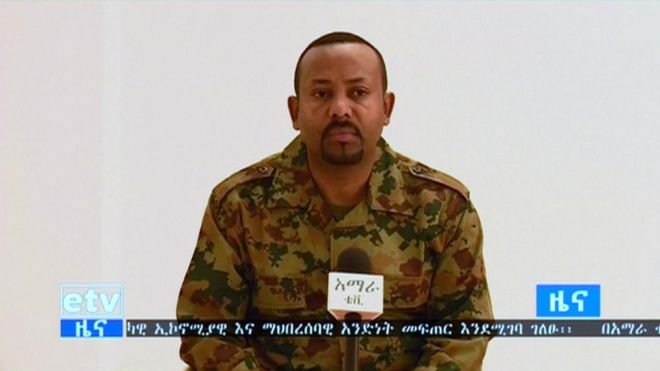The chief of staff of the Ethiopian army, Gen Seare Mekonnen, has been shot dead in the capital, Addis Ababa, state media confirm.
He was shot trying to prevent a coup attempt against the administration in Ethiopia’s northern Amhara region, PM Abiy Ahmed said on state TV.
In Amhara itself, the regional governor, Ambachew Mekonnen, was killed along with another official.
Ethnic violence has hit Amhara and other regions in recent years.
Since his election last year, Mr Abiy has moved to end political repression by releasing political prisoners, removing bans on political parties and prosecuting officials accused of human rights abuses.
The US state department has warned its staff in Addis Ababa to stay inside, saying it is aware of reports of gunfire in the city on Saturday.
What do we know about the attacks?
Information is scanty, with reports that internet has been down, but Prime Minister Abiy, dressed in military fatigues, went on TV to make his announcement.
He said the chief of staff had been shot by “mercenaries”.
The Amhara regional officials were killed by their own colleagues during a meeting, he added.
A statement from the prime minister’s office added: “The coup attempt in Amhara regional state is against the constitution and is intended to scupper the hard-won peace of the region.
“This illegal attempt should be condemned by all Ethiopians and the federal government has full capacity to overpower this armed group.”
Residents in Amhara’s regional capital, Bahir Dar, have reported hearing heavy gunfire.
The ruling party in Amhara has accused a former security chief, who was released from jail after Mr Abiy came to power, of being behind the violence.
Why is Amhara so important?
The homeland of the Amhara ethnic group is the country’s second most populous region and has given Ethiopia its state language, Amharic.
Violence between the Amhara and Gumuz ethnic groups left dozens of people dead last month in Amhara and its neighbouring region, Benishangul Gumuz.
Ethnic violence, typically sparked by land disputes, has displaced nearly three million people across Ethiopia.
Another issue the prime minister is having to grapple with is unrest within the military.
In October, he said that hundreds of soldiers who had matched to his office to demand a pay rise, had wanted to kill him.
BBC






































